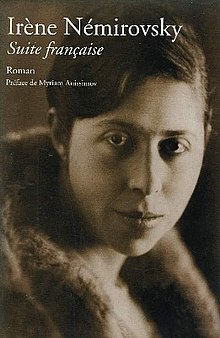Suite française (Irène Némirovsky)

First edition
|
|
| Author | Irène Némirovsky |
|---|---|
| Translator | Sandra Smith |
| Cover artist | Roger Viollet |
| Country | France |
| Language | French |
| Publisher | Denoel |
|
Publication date
|
31 October 2004 |
| Media type |
Paperback Hardback |
| Pages | 434 pp (first edition, paperback) |
| ISBN | (first edition, paperback) |
| OCLC | 56682049 |
| 843/.912 22 | |
| LC Class | PQ2627.E4 S85 2004 |
Suite française (French pronunciation: [sɥit fʁɑ̃sɛz], "French Suite") is the title of a planned sequence of five novels by Irène Némirovsky, a French writer of Ukrainian-Jewish origin. In July 1942, having just completed the first two of the series, Némirovsky was arrested as a Jew and detained at Pithiviers and then Auschwitz, where she was murdered, a victim of the Holocaust. The notebook containing the two novels was preserved by her daughters but not examined until 1998. They were published in a single volume entitled Suite française in 2004.
The sequence was to portray life in France in the period following June 1940, the month in which the German army rapidly defeated the French and fought the British; Paris and northern France came under German occupation on June 14. The first novel, Tempête en juin (Storm in June) depicts the flight of citizens from Paris in the hours preceding the German advance and in the days following it. The second, Dolce (Sweet), shows life in a small French country town, Bussy (in the suburbs just east of Paris), in the first, strangely peaceful, months of the German occupation. These first two novels seem able to exist independently from each other on first reading. The links between them are rather tenuous; as Némirovsky observes in her notebook, it is the history and not the characters, that unite them.
The third novel, Captivité (Captivity), for which Némirovsky left a plot outline, would have shown the coalescing of a resistance, with some characters introduced in Tempête en juin and Dolce having been arrested and put under threat of death, in Paris. The fourth and fifth novels would perhaps have been called Batailles (Battles) and La Paix (Peace) but these exist only as titles in Némirovsky's notebook, against which she had placed question marks. Nothing can be said about the plots of Batailles and La Paix. To quote Némirovsky's notes, they are "in limbo, and what limbo! It's really in the lap of the gods since it depends on what happens".
...
Wikipedia
